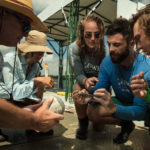UWF graduate student monitors Gulf Waters for oil-related changes
Facing a collection of Gulf-water-filled beakers in a University of West Florida lab, biology graduate student Melissa Overton explains her role with the UWF oil spill research mission.
“I am looking at the bacterial community, basic microbe ecology, in the coastal waters off the beaches of Pensacola and Navarre,” said Overton. “Bacteria are the key to fundamental water quality and I am studying the bacteria that are free floating in the water and how they may be affected.” Nutrient cycles, growth rates and community structures as well as salinity and chlorophyll A counts are all under scrutiny.
Since the initial April 20 Deep Horizon oil well explosion, the well just off the Louisiana delta has been sending a river of crude oil in the Gulf waters every day. So far, BP’s efforts to stem the flow have been unsuccessful.
Immediately after the spill started, teams from UWF began collecting water and sand samples from four different sites and work began in the lab to create a baseline from which to monitor for oil’s presence and its negative impact. Overseeing research effort are: Richard Snyder, director of the Center for Environmental Diagnostic and Bioremediation at UWF; the center’s core faculty, Jane Caffrey, Joe Lepo and Wade Jeffrey; Fred Hileman, organic analysis; Carl Mohrherr, research associate; Barbara Albrecht, watershed coordinator; Overton, as well as undergraduate student Melinda Bottenfield; and volunteers.
Overton said bacterial communities impacted by oil in other parts of the world have been studied, but no such studies exist involving the Gulf of Mexico. She and other UWF researchers want to know how the Gulf’s bacterial community will tolerate the oil’s presence.
“Usually, the bacteria are pretty resilient, however, if not, then we could have trouble through the food web,” Overton said.
Her research includes the “radio tracer method” to measure protein synthesis to estimate bacterial growth rates and a process called “triplet terminal restriction fragment length polymorphism” which is akin to a DNA fingerprinting method, to monitor the bacteria community structure for changes. Eventually, data she compiles will be combined with data from those monitoring for the presence of hydrocarbons. Then, the task will be to identify possible trends and correlations.
Currently, the research plan will continue the sample collection/research process for about 10 weeks and then reassess. By that time, researchers should be able to determine whether the bacteria community’s basic activities have altered and whether additional, long-term monitoring is needed, she said.
For more information, contact Snyder at (850) 474-2806 or e-mail rsnyder@uwf.edu. Follow the UWF oil spill response at uwf.edu/UWFMain/press/oilspill or on Twitter by searching #uwfoilresponse.
By Susie Forrester, University Marketing Communications


